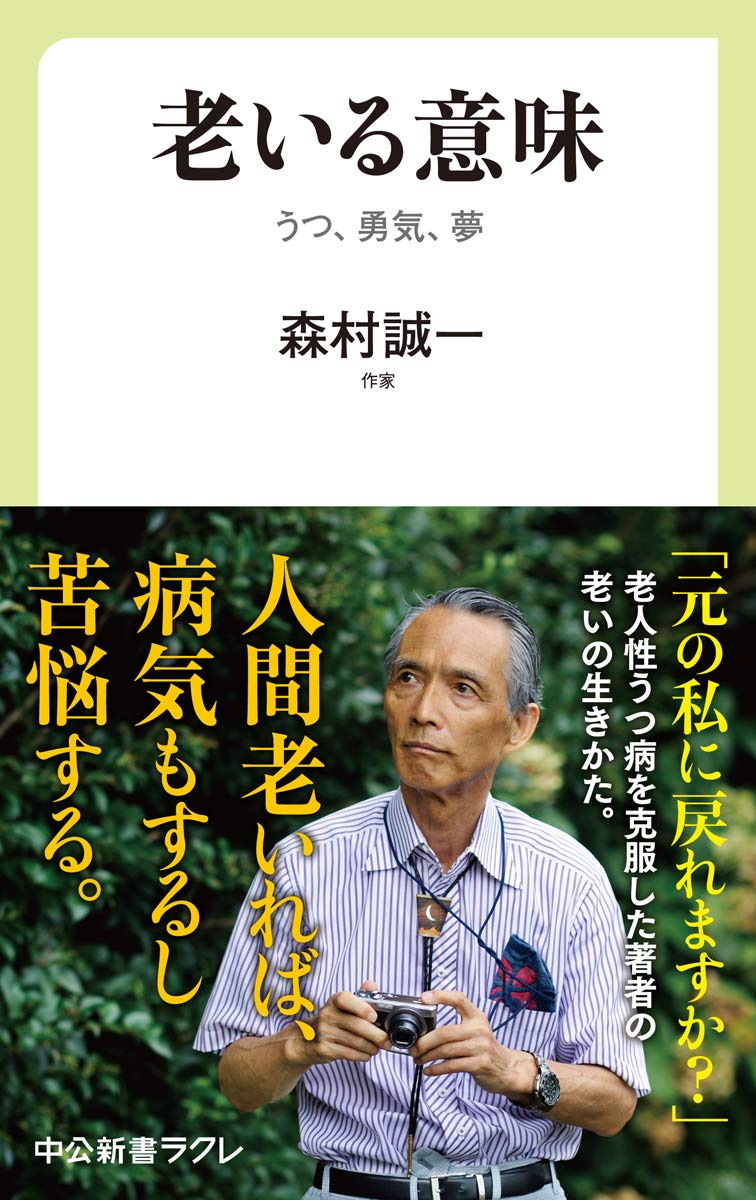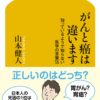
この本を読んだ経緯(どうでもいいことですが)
友人と本を決めて読んで、感想を言い合っています。その友人が明後日(日付が換わったので明日)電話をかけてくる予定です。何日も前に注文していたのに、今日(日付が替わったので昨日)の夕方にやっと届きました。
郵政民営化以降、一時は宅配便に対抗スべく、郵便も早くなりましたが、宅配便とともにゆうメールの配達も日にちがかかるようになった気がします。効率化、合理化の名のもとに人を減らしすぎているのではないかと想像しています。郵政職員(正職員のことです)はもう配達していないのかもしりません。職員が配達していた頃は配達間違いはなかったし、表札がかかっていなくても、家族のことまでわかっていました。地図アプリがあるじゃないか、と言われるかも知りませんが、情報の「質」は比べ物がありません。
久しぶりに「新本」を買いました。図書館の本と違って「線が引けるぞ」と思ったのですが、線を引く間もなく読み終えてしまいました。
タイトルがいいですよね。私も、友人も「老年期」(六十代後半)に入りつつあるので、魅力的なタイトルです。
今、NHKの「100分de名著」でボーヴォワールの『老い』をやっています(講師は上野千鶴子さん)。面白いです(上巻を注文したのですが、いつ来るでしょう)。退職して「引きこもり老人」になってしまった私には切実です。陽に当たることもない(散歩すらしない)生活をしていると、肉体の衰えが切実に感じられます。
「老いる意味」
結論からいうと、「老いる意味」はわかりませんでした。ちゃんと読み込んでいないせいかもしれません。
私は、森村さんの本を(多分)読んだことがありません。日本で最も著名な作家の一人なのに、推理小説作家だと思っていたので読んだことがないのです。
『人間の証明』も『野性の証明』も映画では観ました(薬師丸ひろ子の大ファンなので)。とても話題になった映画(特に前者)でしたが、あまり記憶に残っていません。(^_^;)
途中で、「本当に森村誠一本人が書いたんだろうか」と思ってしまいました。森村誠一を読んだことがないにも関わらず。それだけ、空想の中で森村さんは「偉大な作家」になっていたということです。
ターゲットは?
どの年代に向けて書いたのかがわかりません。これから「老人になっていく」若者なのか、「老人になってしまった」人なのか。「どちらも」というのが正解なのでしょうね。でも、私には「老年期を生きるハウツー本」にしか思えませんでした。そして、彼は「自分自身のため」に書いたのではないか(リハビリを兼ねて?)と思いました。
かろうじてターゲットと思えるのは「都会の老人」です。それも十分な蓄えとともに「老後」を迎えた老人です。それは森村誠一自身だと思うのです。
都市と近代
「子供」と同様に(同時に)「老人」も近代が「発見」したのではないでしょうか。
「都会の老人は、社会の歯車になれていないどころか、ネジにすらなれていない場合もある。」(P.79)
老人問題が、近代の問題だとすれば、それは都市の問題でもあります。この本はそれを鮮明に描いています。ですから、都市でその問題は鮮明化し、先鋭化します。
もちろん、老人も子供も常にいました。都市も少なくとも数千年は存在しています。でも、「市民」という言葉が生まれ、都市と農村の対立が生まれて、生産と消費の対立が鮮明化するのは近代です。「生産人口」なんて言葉が当たり前に使われる時代にはその「生産人口」以外の人間は「尊重」されるわけがありません。それでも子供は将来「生産人口」に入るだろう人ですから、尊重される可能性がありますが、老人にはありません。「俺達の負担が大きくなるから、早く死んでくれ」というわけです。
誰も(大抵の人は)自分の親が早く死んでくれ、とは思いません。自分の親は長生きしてほしい、でもほかの老人は死んでほしい、といったところでしょうか(笑)。今は男性の方がそう思っているかもしれませんが、女性の社会進出が進んでいる今日、女性も自分の給料から税金や社会保険料が毎月引かれるたびにそう思う可能性が高まっていると思います。考え方や「らしさ」なんかはそんなことで変わります。
「高齢者インフレ時代」(P.105)
いい表現だと思いましたが、「増えすぎている」ほどの意味でしょうか。需要以上に供給されている意味ではないでしょうね。作家は知識人です。安易に経済学用語を使うと、知識人の質が問われることになります。
でも、近代とは経済の時代です。だから、このような表現も素直に受け入れられます。ひょっとしたら流行るかもしれません。だからこそ、「なぜ」このような表現が可能なのか、受け入れられるのかを問わなければなりません。
「お荷物老人」にならないように、「家族に対してどのように接すればいいのであろうか」(同)という問いに「いずれ孤独になるにしても、家族がいるうちは家族との関係を蜜にしておきたい。」(同)という答えを出しているうちは、この問題は解決しないのです。
「自分次第」(P.194)
けっして今流行りの(政府が推し進めている)「自己責任」(あるいは「自助」)論ではありません。
私は最近まで、悪いことがあると「社会のせい」「親のせい」にしてきました。そしていいことがあると「自分のせい(成果)」だと思ってきました。そのうえで、「だから、社会を変えなければならない」と。
今思えば、とても「自分勝手」ですよね。恥ずかしいけど、そう考えていた自分を「無かった」ことにはできません。「それまでにあったことはリセットしてしまい、ゼロから始まると考えてもいい。(LF)続編やエピローグのつもりでいるのではなく「新章」にすればいいのである。」(P.198)とは思わないのです。
「自分次第」という考えも、今更「他人のせい」や「親のせい」にすることはできませんから当然です。「新章」という考えも「自分次第」という考えも「歳をとって体が思うように動かず、言葉が思うように出てこなくなった」と思い始めている私は力づけられます。若い頃だって、「明日からは新章だ」と思えればとても気が楽になって、力が湧いてきたでしょう。
でも私は、その自己否定(反省)そのものを肯定的に捉えたいと思っています。自己と社会(他者)というものの対立構造そのものを問いたいのです。
「否定の否定は否定である」(『否定弁証法』(アドルノ)を私なりに解釈したものです)でななく、「肯定的否定」によって、テーゼを維持したままでテーゼを否定し(アンチテーゼ)その両方を止揚することが可能になると考えています。弁証法はそれしかないと。実際の社会もそのように変化していると思うのです。自己と社会は対立し、敵対しているというその構造(主客構造)そのものを問に付したいのです。
社会、あるいは自分の肉体そのものまで考えた上で「自分次第」と言わなければ単なる唯心論になってしまいます。思い通りにならないからこそ、「老いることの問題」に気がつくのですから。
「老いる意味」
この本には、私たち「老けたなあ、もう夢も希望も気力も持てないなあ」と落ち込み、諦めている人に対する様々な「アドバイス」が書かれています。それらを「試してみる」価値は十分にあると思います。それらの言葉はエネルギーになります。「栄養ドリンク」で元気をつけようと思っているのなら、この本を読むことをおすすめします。
ただ、私には毎日喫茶店に行くお金はないし、私が住んでいる田舎には散歩の途中に寄れる喫茶店そのものがありません。散歩の時間は有り余るほどありますが。
「老いる意味」は美味しいものを食べることでも、散歩をすることでもないと思います。年金生活でも、生活保護でもいい。会社に縛られることが無くなったからこそ、「生産人口」から外れたからこそできることがあると思うのです。子供と同じ立場に立ったのです。子供と違うのは若者時代を通過したことがあるということでしょうか。若者は子供を否定することで大人になりました。そして、自分の将来である老人を否定することで「生産人口」の地位に収まることができます。
フランツ・ファノンは『黒い皮膚・白い仮面』で黒人に話しかける白人の態度を描いています。易しい言葉を選んでゆっくり話しかけます。そして、黒人が正確なフランス語を返してくると驚き、否定しようとします。日本人が外国人(金髪で白い肌の人とか、黒い肌の人とか、明らかに外国人だと思われる人)に話しかるときも同じですよね。ゆっくりと簡単な日本語を選んで話しかけます。相手が流暢な日本語で返事をすると、「日本人みたい」と言うわけです。私たちが、子供や老人に話しかけるときも同じです。ゆっくりと易しい言葉で話しかけ、子供や老人が若者同様に返答すると、驚いて「子供らしくない」とか「ジジイじゃない」とか驚いたり、否定したりしませんか。肝心なことは「女子供は引っ込んでろ」「ジジイババアは引っ込んでろ」ということになるのですが、「女」のほうはすぐに「セクハラ」と言われるようになりましたが、「子供」と「ジジババ」はなぜかハラスメントにはなりませんね。
老人は昔の若者だから、そこに壁がなかったことを知っています。子供はまだ「経済合理主義」に絡み取られていません。上に書いた「話しかけ」は差別そのものです。「生産人口」あるいは「経済合理主義」という壁・垣根が存在しないことを明らかにできるのは今は老人だけです。
労働組合が力を失った今だからこそ、老人・若者・子供、そして男と女がその垣根を超える可能性が出てきたのだと思うのです。そこに「老いる意味」とその解消(止揚)の可能性が見えてくるのだと思います。
「垣根」の解消が「定年延長」や「年金支給年齢の引き上げ」でないことは言うまでもありません。
補足
「性」に関して森村さんは「大切だ」と言いつつ消極的なように思います。なんか、歳を取ると「性を超越する」存在になるというような雰囲気があるのです。私は「男と女の壁などない」といいたいので、それらしきことを書きましたが、「壁」はなくても「河」はあります(『黒の舟唄』)。だから、「ロマン」が生じると思うのです。だから「船を漕ぎ続け」る事が必要ですし、そのエネルギーが湧いてきます。人と人がわかり合おう(関わろう)とするというのはそういうことです。
差別をなくすということは、「違い(差異)」をなくすということではありません。「バリアフリー」「点字ブロック」・・・。差異を物理的に完全になくすことは不可能です。だから「違い」なのです。ホロコースト同様に女性をなくしてしまえば差別はなくなりますが、さすがのヒトラーもそういう結論は出さなかったようですね。
⟨impressions⟩
How I read this book (I don't care)
I decide to read a book with my friends and share my thoughts. The friend will call you the day after tomorrow (tomorrow because the date has changed). I ordered it many days ago, but it finally arrived this evening (yesterday because the date changed).
After the privatization of the postal service, the postal service has become faster at one point in order to counter the courier service, but I feel that it will take longer to deliver Yu-Mail along with the courier service. I imagine that we are reducing the number of people too much in the name of efficiency and rationalization. The postal staff (regular staff) may no longer deliver. When the staff was delivering, there was no mistake in delivery, and even if the nameplate wasn't on, I knew about my family. You may be told that there is a map app, but the "quality" of information is incomparable.
I bought a "new book" for the first time in a long time. Unlike the books in the library, I thought "I can draw a line", but I finished reading it shortly after drawing the line.
I like the title. Both I and my friends are entering "old age" (late sixties), so it's a fascinating title.
Now, I'm doing Beauvoir's "Old" in NHK's "100 Minutes de Meicho" (Lecturer is Chizuko Ueno). It's interesting (I ordered the first volume, but when will it come). It is urgent for me who retired and became a "hikikomori old man". If you live a life that is not exposed to the sun (even if you do not take a walk), you will feel the physical decline.
"The meaning of aging"
In conclusion, I didn't understand the meaning of aging. It may be because it is not loaded properly.
I haven't (probably) read Morimura-san's book. Although he is one of the most prominent writers in Japan, I have never read it because I thought he was a detective novel writer.
I saw both "Proof of the Man" and "Never Give Up" in the movie (because I'm a big fan of Hiroko Yakushimaru). It was a very talked-about movie (especially the former), but I don't remember much. (^ _ ^;)
On the way, I wondered, "Is Seiichi Morimura really writing it?" Even though I have never read Seiichi Morimura. That's why Mr. Morimura became a "great writer" in his fantasy.
What is your target?
I don't know what age I wrote for. Is it a young man who is "becoming an old man" or a person who is "becoming an old man"? The correct answer is "both". But to me, it seemed like a "how-to book for living in old age." And I thought he wrote it "for himself" (also for rehabilitation?).
The one that barely seems to be the target is the "old man in the city." It is also an old man who has reached "old age" with sufficient reserves. I think it is Seiichi Morimura himself.
City and modernity
I think the modern era "discovered" the "old man" as well as the "child" (at the same time).
"Old people in the city may not even be the gears of society, or even the screws." (P.79)
If the old man problem is a modern problem, it is also an urban problem. This book depicts it clearly. So in the city the problem becomes clearer and sharper.
Of course, there were always old people and children. Cities have existed for at least thousands of years. However, it is modern that the word "citizen" is born, the conflict between urban and rural areas is born, and the conflict between production and consumption becomes clear. In an era when the word "working-age population" is used as a matter of course, people other than the "working-age population" cannot be "respected". Still, children are people who will enter the "working-age population" in the future, so they may be respected, but old people do not. "Because our burden will increase, please die early."
No one (most people) think that their parents will die sooner. Do you want your parents to live longer, but other old people to die (laughs)? Men may think so now, but now that women are advancing into society, women are more likely to think so every time taxes and social insurance premiums are deducted from their salaries. I think that there. That's how the way of thinking and "likeness" change.
"The Elderly Inflation Era" (P.105)
I thought it was a good expression, but does it mean "too much"? It doesn't mean that it is being supplied more than demand. The writer is an intellectual. The easy use of economic terms will question the quality of intellectuals.
But modernity is an era of economy. Therefore, such expressions are also accepted obediently. Maybe it will be popular. That is why we have to ask "why" such an expression is possible and acceptable.
In order not to become a "luggage old man", the question "How should I treat my family?" (Same as above) "Even if I become lonely, as long as I have a family I want to keep my relationship with my family honey. ”(Same as above), this problem will not be solved.
"It's up to you" (P.194)
It is by no means a popular (government-promoted) "self-responsibility" (or "self-help") theory.
Until recently, I've blamed "society" and "parents" for bad things. And I thought that there was something good that was my fault (result). On top of that, he said, "That's why we have to change society."
If you think about it now, it's very selfish. It's embarrassing, but I can't say I wasn't there. "You can think of what you've been up to as resetting and starting from scratch. (LF) Instead of trying to be a sequel or epilogue, you can make it a" new chapter. " I don't think (P.198).
The idea of "it's up to you" can't be blamed on "others" or "parents" anymore. Both the idea of "new chapter" and the idea of "it's up to me" are empowering as I begin to think that "as I get older, my body doesn't move as I want and the words don't come out as I want." Even when I was young, if I thought, "It's a new chapter from tomorrow," it would be very easy and powerful.
But I want to take the self-denial (reflection) itself positively. I would like to ask the confrontational structure itself between self and society.
Negative denial is not "denial is denial" (I interpret "Negative Dialectics" (Adorno) in my own way), but by "positive denial", the thesis is denied while maintaining the thesis. (Antithesis) I think it will be possible to stop both of them. That's the only dialectic. I think that the actual society is changing like that. I would like to question the very structure (main customer structure) that self and society are in opposition and hostile.
If you don't say "it's up to you" after thinking about society or your own body, it's just spiritualism. Because you don't get what you want, you realize the "problem of aging."
"The meaning of aging"
This book contains various "advice" for those who are depressed and give up, saying "I'm old, I can't have dreams, hopes, or energy anymore." I think it's well worth trying them out. Those words become energy. If you're looking to rejuvenate with "energy drinks," I recommend reading this book.
However, I don't have the money to go to a coffee shop every day, and in the countryside where I live, there is no coffee shop that I can stop by during my walk. I have plenty of time for a walk.
I don't think "meaning to get old" is to eat delicious food or take a walk. It can be pension life or livelihood protection. I think that there is something we can do because we are no longer tied to the company and because we are out of the “working-age population”. He was in the same position as a child. Is it different from a child that he has passed through his youth? Young people became adults by denying children. And by denying the old man who is his future, he can be in the position of "working-age population".
Frantz Fanon describes the attitude of white people talking to black people in "Black Skin, White Masks". He chooses easy words and speaks slowly. And he is surprised that he returns the correct French and tries to deny it. The same is true when a Japanese person talks to a foreigner (a person with blond hair and white skin, a person with black skin, or a person who is clearly considered to be a foreigner). Slowly choose simple Japanese and speak. When the other person replies in fluent Japanese, he says "like Japanese". The same is true when we talk to children and old people. Speak slowly and in easy words, and when a child or an old man responds like a young man, why not be surprised or denied that he is "not childish" or "not crazy"? The important thing is to "retract girls and children" and "retract Jijiibabaa", but "women" soon came to be called "sexual harassment", but "children" "Jijibaba" is not harassment for some reason.
Because the old man is an old young man, he knows there was no wall there. Children have not yet been entangled in "economic rationalism." The "talking" I wrote above is discrimination itself. Only old people can now make it clear that there are no barriers or barriers to "working-age population" or "economic rationalism."
Now that the labor union has lost its power, I think there is a possibility that old people, young people, children, and men and women will cross the barrier. I think that the "meaning of aging" and the possibility of its elimination (suspension) can be seen there.
It goes without saying that the elimination of the "hedge" is not "extension of retirement age" or "raising the age of pension payment".
Supplement
Mr. Morimura seems to be reluctant to say "important" regarding "sex". Somehow, there is an atmosphere that becomes "transcendental" when you get older. I wanted to say that there is no wall between men and women, so I wrote those things, but even if there is no "wall", there is a "river" ("Black Boat Song"). That's why I think "romance" will occur. Therefore, it is necessary to "continue rowing the boat", and that energy will spring up. That's what people try to understand.
Eliminating discrimination does not mean eliminating "differences". "Barrier-free" "Braille block" ... It is impossible to completely eliminate the difference physically. That is why it is a "difference". As with the Holocaust, if we lose women, discrimination will disappear, but it seems that Hitler did not come to such a conclusion.
Junichi Watanabe's book, which is the same writer about the sex of old people, is interesting, and recently, " There is a masterpiece called Spring, Death ”(written by Mana Sakura).
[著者等(プロフィール)]
森村誠一
一九三三年、埼玉県熊谷市に生まれる。五八年、青山学院大学英米文学科卒業。六九年『高層の死角』で江戸川乱歩賞、七三年『腐蝕の構造』で日本推理作家協会賞、七六年『人間の証明』で角川小説賞、二〇〇三年に日本ミステリー文学大賞、〇八年『小説道場』で加藤郁乎賞、一一年『悪道』で吉川英治文学賞を受賞。著書に『新幹線殺人事件』『悪魔の飽食・三部作』『殺意の重奏』『人間の十字架』『新編平家物語』『煌く誉生』『太平記』『人間の条件』『炎の条件』『野性の条件』『魂の切影』など多数。
老後は勇気をなくして乗り切れない。今までの人生の経験を凝縮して明日に立ち向かう。老後は良いことばかりではない、思わぬ病気もする。老人性鬱病を告白し克服した作家の壮絶な闘い。老後の生き方の意味を提言する森村誠一渾身の話題作。


